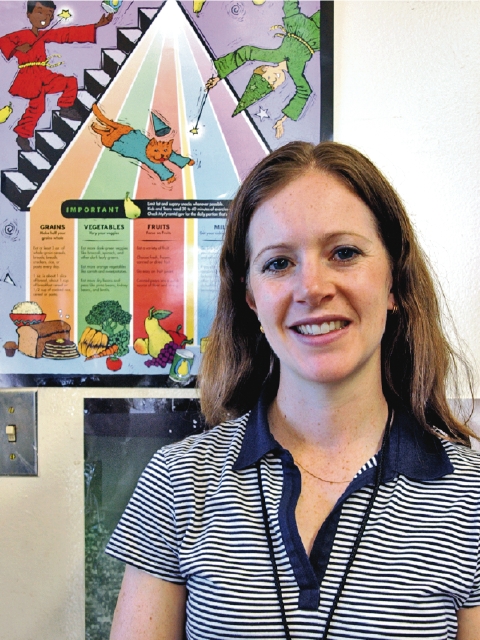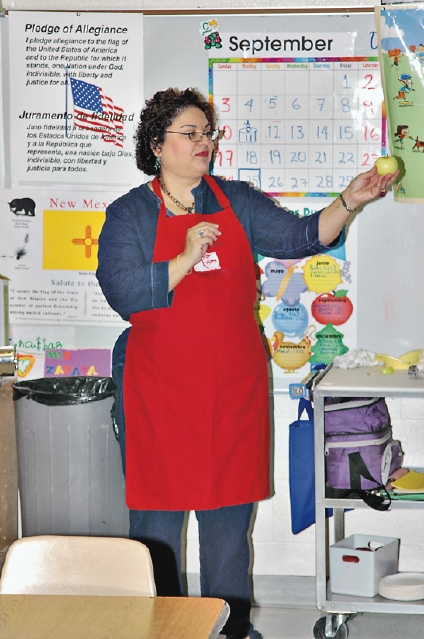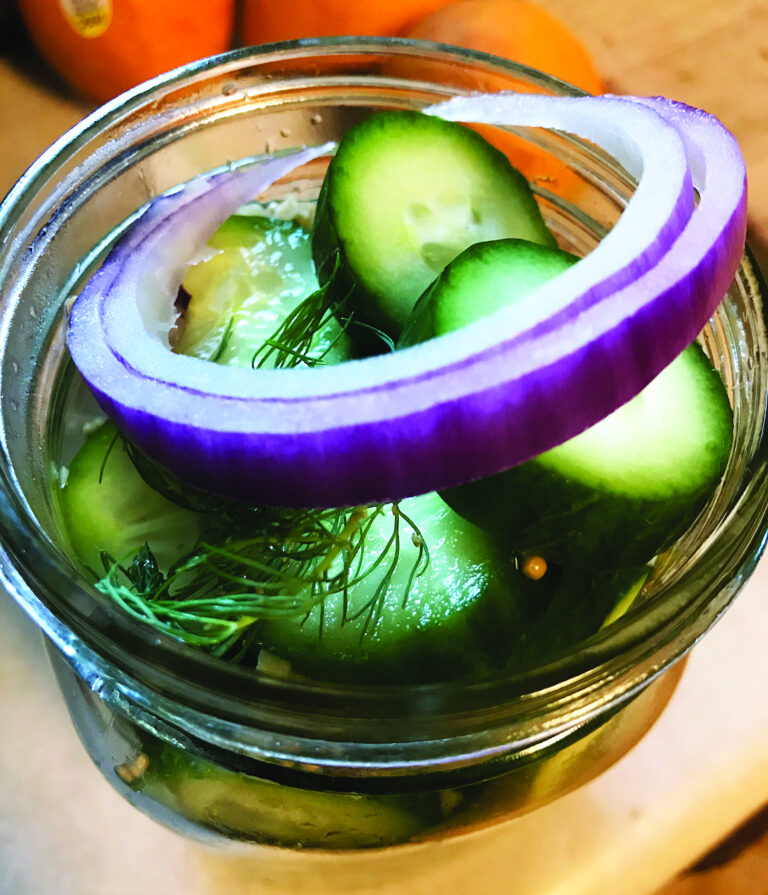Looks like APS deserves a shiny red apple. This year, our schools are getting very good grades when it comes to student health. “A healthy child is a better student,” explains Stephanie Tierney, nutrition coordinator for Albuquerque Public Schools (APS). As research linking health to learning accumulates, New Mexico schools are taking the steps necessary to improve student wellness. This year, the state created a comprehensive student health policy that rated among the top five in the nation. Meanwhile, an innovative program called Kids Cook! is teaching kids how to make and maintain healthy life choices. Unfortunately, child health has deteriorated markedly in the last several years thanks to the surging obesity epidemic. National child obesity rates have tripled since 1980. A study recently published in the New England Journal of Medicine warned that, for the first time in two centuries, the average lifespan of the young generation would likely decrease rather than increase compared to the previous generation. With these troubling facts in mind, the U.S. Congress added a new requirement when it reauthorized funds for school lunch programs. In 2004, the Child Nutrition and WIC Reauthorization Act required that school wellness policies be designed and realized at the local level. These policies are being implemented this year across the country.Jennie McCary, the buoyant young wellness coordinator of APS, says there was a lot of positive energy involved in crafting our state’s policy. “New Mexico jumped on the opportunity,” she says.Before drafting the actual policy, administrators and community members alike considered all the forces affecting students’ wellbeing. They created a model that includes not just nutrition and physical activity, but also family, culture, community partnership and social health. The policy was drafted with all these factors in mind. “Our policy is fairly strict and very comprehensive,” says McCary. It was these high standards that earned our student wellness policy a ranking of fourth in the nation, as assessed by the Center for Science in the Public Interest in a June 2006 report. Their grading was unforgiving, with only one state in the nation achieving an A (congratulations, Kentucky!). But New Mexico wasn’t far behind with a grade of B+. Once the state policy was set, it was up to each school to figure out how to implement it. Here in the Duke City, public schools relied on the Physical Activity & Nutrition Advisory Committee (PANAC) for guidance. PANAC includes parents, teachers, administrators and concerned members of the community, and is open to all who are interested.The Student Wellness Policy demands that schools make many significant changes, and the adjustments aren’t always easy. One of the biggest obstacles is the reliance of schools on money from food sales.In fact, in recent years, schools have inadvertently become facilitators of childhood obesity. From candy bar fundraisers to vending contracts, schools had found themselves dependent on junk food to raise money. Stephanie Tierney recalls, “We had a school where the principal’s office was actually selling king-size candy bars to elementary students at the end of the school day.” Such practices were well-intentioned fundraisers for school clubs, but the health implications were hard to ignore.Breaking the food-money habit was difficult for many at APS, according to Kay McSherry, mother of four children educated in APS and member of PANAC. “The board of education was slow in coming to support [the student wellness policy],” she says. “I think their concern was that it was going to impact financing in the district. They were worried the clubs would be impacted.”But McSherry is confident the school clubs will find other successful fundraisers. “I think they can find alternate ways—they can work within the plan we have.” She says PANAC has been working on alternate ways of fundraising that doesn’t involve selling food and snacks. But food fundraisers weren’t the only way schools depended on food to raise money. Schools had also become financially dependent on contracts with soda vendors. PepsiCo has a seven-year $1.2 million exclusivity contract with APS that will not expire until 2007. Most health experts believe “empty” calories consumed in sodas have a significant impact on obesity. Though earlier this year beverage companies voluntarily removed several of their high-sugar products from schools, the New Mexico Student Wellness Policy will now require that the beverage industry go much further. For example, no soda products whatsoever may be vended in elementary and middle schools. The strictest regulations apply to the elementary schools, permitting that only milk, soymilk and water may be vended to students. Regulations are progressively more lenient for the older grades, and at the high school level, the sales of sports drinks, sugar-free and caffeine-free sodas are permitted.The wellness policy also sets standards for fat, sugar, sodium and calorie content of foods.Jennie McCary enthusiastically looks forward to schools where students can be seen “walking around with bottles of water and bags of nuts for snacks, as opposed to sodas and Hot Cheetos.” But providing nutritious foods is only one way schools are helping improve the health of their students.Kids Cook!
Besides creating an environment where healthy food choices are widely available, schools are going a step further by giving students the skills to make healthy eating choices for the rest of their lives. Kids Cook! is a hands-on program that educates students about basic nutrition and exercise while providing practical lessons in healthy food selection and preparation. The program was initiated several years ago and has been expanding rapidly. Currently, Kids Cook! serves nine schools and 4,000 students. Making the right choices isn’t easy in a world where sedentary activity is the norm and unhealthful foods are the most convenient and heavily advertised. Overcoming these influences requires that kids have knowledge, skills and a sense of empowerment—three objectives addressed by Kids Cook! Valerie Swanson began working with Kids Cook! as a volunteer, and is now employed with the program as a nutrition educator. As for the work, “it’s inspiring,” she says. Lessons are diverse, emphasizing affordable, nutritious, culturally diverse foods. This year’s curriculum includes cuisines from Peru, India, the Mediterranean and the American Southwest. “They’re eager to make the recipes at home,” says Swanson. “I have kids coming up to me [after a lesson] and telling me, ‘Guess what I had to eat today? Whole grains!’”All lessons also include basic exercise.“At first, none of the kids know how many minutes of exercise they need to do every day to stay healthy. They guess: 10 minutes, five minutes—I’ve even heard two minutes. But after the first class, they know that they need sixty minutes, and they don’t need to be playing a sport to get it.” As an added bonus, the hands-on learning environment allows students who struggle with traditional academics to succeed. According to Swanson, those “that have been deemed ‘poor behavioral students’ often become a great asset to Kids Cook! That definitely touches my heart when parents can see their children enjoying the learning environment.” APS has already come a long way toward improving the health of its students, though plenty more remains to be done. Comprehensive student health requires comprehensive participation by the community, says McCary. “The schools can’t do this on their own,” she says. “They need the support of parents, business people and elected officials. It’s really going to take the support of everybody.”
For information on the Kids Cook! program, contact program director Hope Miner by phone at (505) 897-5700, or e-mail hope.miner@state.nm.us. To help shape the new School Wellness Policy, contact Jennie McCary by phone at (505) 345-5661 ext. 37022, or e-mail mccary@aps.edu.











